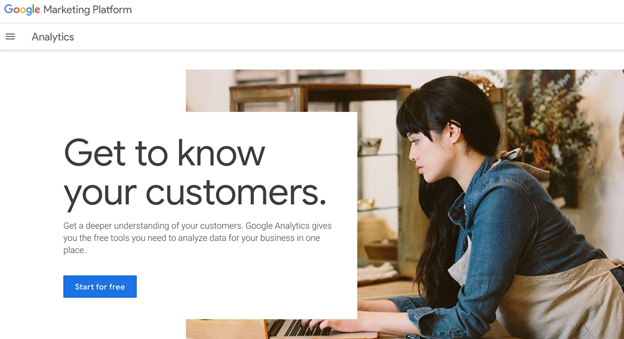Have you ever thought about why you purchase products or services from certain brands or companies?
The brand or company was successfully able to grab your attention, solve a problem for you, and thus create a mutually beneficial relationship where you’re buying something you really want and they’re getting a customer who really likes them.
This whole relationship exists because of effective marketing. Though traditional marketing is what most people are familiar with, and is what was most popular 30 years ago, things have changed. Today, digital marketing reigns. This form of marketing looks to websites, search engines, social media, email, and more to build strong relationships with potential and current customers.
With this form of marketing, people can make decisions (purchases) in a matter of minutes. Everything is convenient and (almost) immediate, and people happily get their purchases much more quickly than they did in the time of traditional marketing.
Digital marketing has made it easier for companies, regardless of their location, to reach consumers all around the world and increase brand awareness by using things such as social media, digital ads, SEO, and more.
Now more than ever, digital marketing is one of the most important aspects of a company. And guess what? Not everyone fully understands the world of digital marketing, and many people don’t have the time or interest to learn more about it.
That’s where you come in. It is not an easy process to master the art of digital marketing but when you do, you’ll be amazed at how much opportunity is available to you.
If this sounds like something you’re interested in, then read on to find out how to start a digital marketing business.
The Easy Parts of Starting a Digital Marketing Business
Starting a digital marketing business in the 21st century is incredibly exciting.
It is a lucrative industry that is only continuing to grow. It doesn’t seem like things are going away from digital anytime soon, if ever.
Thus, there is great opportunity for you to find success and enjoyment in starting this kind of business.
And thankfully, it doesn’t all have to be hard work. There are some pieces of starting a digital marketing business that are easier to handle, so let’s start with those.
Build a Website
Though not the very first step in starting your digital marketing business (there is much that comes before this, which we will cover below), building a website is a very important part of your business. And it doesn’t have to be difficult.
You can try your hand at building your own by using a do-it-yourself site builder such as WordPress or Squarespace and taking advantage of the templates that they offer.

Many of the templates on these websites are built so you only have to drag and drop your information into the website and it’s ready to go.
Of, if you aren’t up for the challenge of building your own website, you can hire someone else to do it for you. This is the way to go if you don’t have the time or patience to learn how to do a website on your own.
Set Up Google Analytics
Once you have your website built, one of the first things you want to do is set up your Google Analytics.
Google Analytics is one of the most powerful digital marketing tools that exist. You do not want to have your digital marketing business without connecting Google Analytics to it.

And one of the best parts about this important tool is that it is free.
Though many people think this tool is only about looking at the traffic to your website, there is much more to it.
Google Analytics allows you to see that when a specific marketing campaign is bringing traffic to your website or your client’s website. This lets you analyze what is working, and what you need to do to keep this success going.
It also allows you to see where you need to put in more work, where some of your strategies aren’t producing the results you hoped for so that you can adjust.
The Difficult Parts of Starting a Digital Marketing Business
As much as we would like it to be all fun and games and success with minimal effort, that is just not the way things go as a business owner.
You must put in the time and the work in order to make your business successful, especially when that business is a digital marketing one.
So, let’s get into some of the hard parts of starting your own digital marketing business so that you know what to watch out for.
Finding customer needs and providing a solution
Companies find success in digital marketing because they have been able to find a customer’s need or problem, and offer a solution to that problem.
Thus, this is a crucial part of building your digital marketing company but is not as easy as it may seem.
Start with determining what some of your potential customer problems are. What do they need help with when it comes to digital marketing?
The best way to go about determining what your potential customer needs and how you can meet those needs is by following these steps:
- Identify what they need via keyword research
- Brainstorm solutions
- Create content that promotes your solution
- Gather feedback on how your solution helps them
Creating a strategy for client acquisition
Your digital marketing business can’t survive without clients.
So how do you go about getting those clients?
By creating a strategy.
This may sound easy but takes time and work to do successfully. Here are some of the best ways that you can find clients:
- Cold emails. Reach out to potential clients who need your digital marketing skills to help their business.
- Networking. One of the best ways to find clients for your digital marketing agency is to go to events and networks where you’ll find entrepreneurs and business owners. You never know who you will meet at these events, and chances are you’ll meet someone who is looking for help in digital marketing.
- Advertizing pitches. Perfecting your pitch on how you can help a brand with its digital marketing is key. This pitch needs to encompass your marketing strategy and how the company stands to benefit from hiring you.
Step 1: Define your offer, and your target audience
Before you go too deep in the depths of your digital marketing business, it is important that you first start with deciding what it is you are offering clients.
Once you’ve determined what your offer is, you then want to determine who your target audience is
ROI
What is the ROI that they will get from your digital marketing services? What will they get back from the money they invest in hiring you–and how soon will they get it?
If you aren’t able to justify your value, then your clients won’t be able to justify spending money on you – it’s as simple as that.
Target Audience
You may find it overwhelming to try and offer digital marketing services to every kind of company out there. Instead, niche down into something that you feel you are an expert in.
To help you determine your target audience, you will want to ask yourself the following questions about your ideal client? This client could be a real company that you dream to work with or a hypothetical company that checks all the right boxes for you.
- How much money does my potential client make?
- How many employees do they have?
- What industry do they work in?
- What are the biggest problems that this client faces?
- What solution am I offering that is unique?
By answering some of these questions, you will have a clear vision of what you offer and who to offer it to.
Step 2: Create your online presence
Now that you have the idea of your digital marketing business ready to go, it is time to share it with the world.
The first step in doing that is to create an online presence via both a website and social media if it works with your target audience.
Website
A website is a non-negotiable for your digital marketing business. People need a place to go for more information and to see some of the work that you have done for your clients.
If you are feeling overwhelmed with the thought of building a website because it’s not something that is in your wheelhouse, don’t worry – we have a solution: Squarespace.

Squarespace is the platform on which you can build your website to bring in your dream clients. And it doesn’t have to be as difficult as you think building a website is.
Squarespace offers plenty of eye-catching templates that make it easy for you to drag and drop your information in and get your website up and running in no time. You can customize the templates as much or as little as you want to, and you can change the way your Squarespace website looks at any time.
You may find that as your digital marketing business grows, it may change and you can easily reflect those changes in your website with Squarespace.
Squarespace offers a range of tools for your website including a portfolio, blog, analytics, help with SEO, and integrations.
This platform offers a few different packages so that you can choose which one works best for you. However, when starting out with your digital marketing business, we suggest going with the Business package.
The Business option is priced at $18 per month and includes:
- Free custom domain
- SSL security
- Unlimited bandwidth and storage
- SEO features for site visibility
- Templates to fit every need
- Unlimited contributors
- Mobile-optimized websites
- 24/7 customer support
- Basic website metrics
- Squarespace extensions
- Professional email from Google
- Premium integrations and blocks
- Complete customization with CSS and JavaScript
- Advanced website analytics
- Up to $100 Google Ads credits
- Promotional pop-ups and banners
- Fully integrated e-commerce
- 3% transaction fees
- Sell unlimited products
- Accept donations
- Gift cards
Social Media
You may decide that your digital marketing business would benefit from starting an Instagram and Facebook account.
Depending on your target audience, you may find that a TikTok account may help your business grow as well.
To properly use these tools, it is important that you become familiar with them and also learn how to brand yourself so that people can recognize your content when they see it come across their feed.
Your social media accounts present a perfect opportunity for you to give clients and potential clients helpful and informative content.
Rather than looking at your social media accounts as a way to sell people via your content, you want to approach your content in a way that creates a community that provides people with information and keeps them coming back.
Step 3: Build a business model
Before getting your first client, you want to think about how you plan to bill that client.
Will you have them pay you by the hour? Will you have a flat retainer? Or will you opt for a performance-based model?
Pay by the hour
Paying by the hour ensures that you get paid for every hour that you work. This may be a good place for you to start your digital marketing business.
Flat retainer
However, as you become better and more efficient at your work, you may decide that a flat retainer model is better for you. This means that you get paid the same amount every month by your client, no matter how many hours you spend on their work.
Performance-based
When you build more confidence in yourself and your company, you may consider switching to a performance-based model. With this model, you may agree with your client to get a percentage of all sales that the company closes. This option is easy to scale and shows the client how much you help in driving sales.
Step 4: Generate Leads
Now that you have the structure of your digital marketing business sorted, and have some quality content to show off your skills, including your website and your social media accounts, it is time to start bringing those clients in.
Pro bono work
When you are first starting with your business, your focus is becoming established in the niche that you’ve opted to focus on. This can take some time, possibly even years.
One way that you can do this more quickly is to offer your services for free to a few clients that you think will help you build your reputation.
When choosing who to offer your work to pro-bono, you want to look at influencers and business leaders who work in your niche. These people are trusted leaders in their industry and are typically well-known. This not only means that they have a big network that you may be able to tap into, but it also means you have the potential for promotion on their platforms.
On top of that, being able to say that you did digital marketing for a specific influencer or business leader may help you get more business.
Take the time to research influencers and business leaders in your niche and reach out to them via email or social media to see if they would be interested in working with you for free.
Cold email
As mentioned above, cold emails are a great way to generate some leads for your digital marketing services.
Here are some expert tips to remember when crafting your cold emails:
- Keep the email short. Do not let your email be any longer than 3 paragraphs.
- Send a series of emails. Do not expect the person to reply the first time, and have a strong follow-up email ready to go.
- Have a short subject line. Something like “A quick question,” or a similar subject is much better than a long one.
- Try to get them on the phone. Come up with a hook that will get them to hop on a call with you. Getting them on the phone makes them more likely to hire you, as they establish a more personal connection with you.
Step 5: Turn your leads into clients
Once you have some leads for your digital marketing services, it is time to do what you can to make these leads your new clients.
Here are some tricks on how to do that.
Research
You must take the time to research the company as well as the person from that company that you are talking with. LinkedIn is a great resource for this.
Researching your contact at the company allows you to create a connection with them, and gives you things to chat about besides strictly business.
And, researching the company is important because it shows that you have a personal interest in the company and do have their goals and success at heart.
Present numbers
When you meet with leads, make sure you bring along with you a presentation that shows the numbers of your work.
Whether this meeting is in-person, via Zoom, or just via email, your potential clients will want to see numbers and how you have helped other people grow their sales via digital marketing. Many people use a slideshow presentation to do this.
from Quick Sprout https://ift.tt/39qQyjy
via IFTTT
